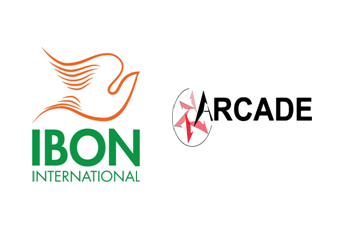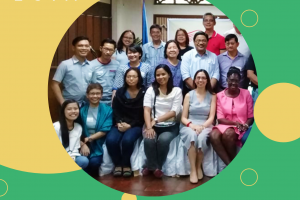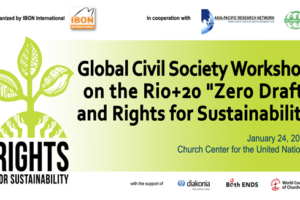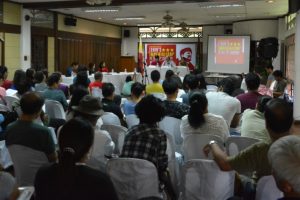[[{“type”:”media”,”view_mode”:”media_large”,”fid”:”1627″,”attributes”:{“alt”:””,”class”:”media-image”,”height”:”239″,”style”:”width: 350px; height: 238px; margin: 5px; float: right;”,”typeof”:”foaf:Image”,”width”:”352″}}]]
(Dakar, October 5-7, 2016) – Africaine de Recherche et de Cooperation pour l'Appui au Developpement Endogene (ARCADE) and IBON International organized a three-day workshop from the 5th to the 7th of October 2016 in Dakar, Senegal. It was attended by civil society organizations and networks such as the International League of Peoples’ Struggle (ILPS), the People’s Coalition on Food Sovereignty (PCFS), African Confederation of Artisanal Fishing (CAOPA), Pesticide Action Network Africa (PAN AFRICA), and the West and Central Africa Office of IBON International.
The discussions in the workshop highlighted the fundamental political and socio-economic issues that confront Africa today: continuing militarization, food crises, and Africa’s entry into the neoliberal Economic Partnership Agreements (EPAs).
Militarization, EPAs, hunger
The discussions of IBON International director Antonio Tujan Jr. and Demba Moussa Dembele from the West-Central Africa office related how militarization and the EPAs are part of the continuing imperialist attacks on peoples. Tujan and Dembele are also members of the ILPS.
Both the economic and military-political dimensions of imperialism, they said, have the objective of controlling African resources.
The military dimension of imperialism in Africa involved so-called security agreements, establishment of foreign military bases, and actual military offensives initiated by developed states and affiliated multilateral organizations. The guise of “humanitarian” operations and the rhetoric of a “war against terrorism” are used to justify foreign military interventions, whileexacerbating violence within the nation-state and violating its national sovereignty.One important example cited in the workshop is the U.S. Africa Command (AFRICOM) which “partners” with African states, turning them into NATO support points for rapid military response against considered threats.
Tujan and Dembele also discussed the economic dimension of imperialism, which according to them came in the form of Economic Partnership Agreements (EPAs) for the economies of Africa. EPAs are considered free trade agreements, initiated by the European Union with African, Pacific and Caribbean (APC) countries. While supposed to encourage free trade and allow for protection for some sectors, EPAs demand the opening up of 80% of African markets to European imports within a decade. [1] Thus, EPAs are neoliberal trade agreements that will encourage the export of raw materials from developing countries and the dumping of manufactured goods and surplus from EU countries. [2] Projected effects of EPAs on Africa would be losses in customs revenues, failures of attempts at industrialization, land grabbing on a large scale, and unsustainable extraction of resources by multinational corporations at the cost of the welfare of the African people.
The issues of hunger and food crises were also raised. According to Roy Anunciacion from the PCFS, two-thirds of the world's population live in poverty with 75% of the poor in rural areas. Furthermore, out of 54 African countries, 20 are in food crisis because of conflicts.
The production by multinational corporations of particular genetically modified seeds was seen as encouraging the further dependence of farmers to these corporations. Proving itself to be another bane to peoples’ rights, farmers will have to buy seeds from corporations every time they need to produce food. Thus corporationswill control the food supply.
Strengthening Resistance
The workshop also resolved to strengthen the participating organizations’ work in resisting the continued imperialist attacks on peoples of Africa and around the world. Education in understanding the links between military and economic issues would be important. It was also established that more participating women and youth leaders would help the organizations. Given that there exists a “No to EPAs” pressure group in Senegal, there also needs to be more organizational efforts in resisting EPAs particularly in Nigeria, Gambia and Tanzania.
Already-existing organizations such as the IBON International office in Dakar and the People’s Coalition on Food Sovereignty would also need continued activity. In resisting imperialism as one of the roots of militarization and EPAs, organizations in Senegal were also encouraged to link themselves with the International League of Peoples’ Struggle. ###
For inquiries, you can contact Henriette Faye, IBON International West and Central Africa, at hfaye@iboninternational.org/ henriettefaye@yahoo.fr
References
McDonald, Steve, Stephen Lande, Dennis Matanda. 2013. “Why Economic Partnership Agreements Undermine Africa’s Regional Integration.” May 3. Wilson Center. https://www.wilsoncenter.org/publication/why-economic-partnership-agreements-undermine-africas-regional-integration
People Over Profit. “EPAs.” People Over Profit web page. http://peopleoverprofit.online/category/epas/



